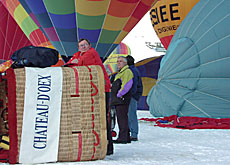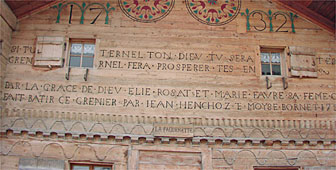Château-d’Oex faces uncertain future

Château-d'Oex's once-proud image as a ski resort is melting away due to global warming and a lack of investment that has seen it fall behind neighbouring tourism centres like Gstaad.
To make matters worse, its tourism director has thrown in the towel, claiming Château-d’Oex refuses to move with the times.
The week-long hot air balloon festival in Château-d’Oex in the middle of January was a grand success, attracting about 60,000 people to the French-speaking resort.
The abundance of snow during the week gave the festival an added lustre, so it was easy to forgive first-time visitors to the Pays d’Enhaut region in western Switzerland for thinking they had landed in a winter wonderland.
But located at an altitude of 970 metres, Château-d’Oex has suffered as global warming has rudely raised the bar above which snow is certain to fall, by about 500 metres.
The departing tourist director, Philippe Sublet, has watched the ski season shrink to just a few weeks a year during his 14 years at the helm.
Sublet says there has been a 20 per cent decrease in the number of overnight stays in holiday accommodation over the past ten years, and his efforts to turn Château-d’Oex into a year-round resort have fallen on deaf ears.
Pedestrian zone
“A lot of locals are still waiting for the snow to return,” he says, with more than a hint of sarcasm in his voice.
“We have to restructure the village centre and we need to turn the main road into a pedestrian zone, but I haven’t been able to get my message across,” he adds.
The authorities, Sublet laments, have spent the past 20 years saying “no” to every development project; “no” to becoming the centre of a proposed biosphere reserve; and “no” to stepping up cooperation with nearby Gstaad.
Not only does Château-d’Oex not have a pedestrian zone, there is not a single luxury hotel in the resort, nor is there an indoor swimming pool, tennis court or sports hall.
Sublet had to find private investors himself to build a bowling alley and amusement centre – which is opening this year – when village officials refused to support the project.
“There are people here who don’t want to change. They understand the problems but they still don’t want to do anything.”
Rich pedigree
Château-d’Oex was one of the first alpine villages to catch the eye of British holidaymakers during the Belle Époque.
They built grand hotels and helped develop winter sports; now the grand hotels, like the promise of white winters, are long gone.
The British are still coming – they are well represented at the balloon festival – but in declining numbers.
“We had a project to build a golf course here but unfortunately we couldn’t get permission from all the farmers, so that had to be shelved,” says Briton Patrick Kearley.
Balloon festival
Kearley is one of the balloon festival organisers whose family first started holidaying in Château-d’Oex in the 1930s. It is his second home.
“I think we have to look for other activities apart from skiing,” he adds.
“It has to broaden the scope of activities that it offers,” says Canadian John Jonas, a regular visitor to Château-d’Oex since the 1950s.
“In the old days we had an outdoor skating rink,” he remembers. “It was cold enough that you could skate outdoors all winter long.”
“When we came 25 years ago they had more activities here,” agrees Dubai businessman Mohamed Al-Sharif al-Hashemi.
“There were lots of activities and lots of tourists but unfortunately the tourists have gone.”
Rustic charm
Hashemi’s wife, Zareen, would like to see a four-star hotel built and a pedestrian zone, but does not want Château-d’Oex to lose its rustic charm.
“We don’t want Château-d’Oex to be exactly like Gstaad, because Gstaad is more commercial,” she says. “And I love the landscape here.”
Gianni Di Marco, the new tourist director, has no choice but to sell the folksy image that remains and the raw beauty of the mountain setting, if he is to attract new visitors.
With no previous experience in the tourism industry, the trained geologist says the natural beauty of the Pays d’Enhaut is the region’s greatest capital.
Di Marco does not think he will have to move mountains to convince the local authorities that change is required if the resort is to improve its fortunes.
“Everybody knows now that we cannot form a strategy based on being a ski resort,” he says.
“We don’t have enough snow, so we have to find other ways to make people come,” he adds.
“The Pays d’Enhaut region has incredible resources in terms of nature and in terms of culture. It’s an interesting balance between people and nature.”
But the authorities, according to Sublet, will have to start investing if they want holidaymakers to make Château-d’Oex their base and get acquainted with the region’s traditions and natural beauty.
swissinfo, Dale Bechtel
The village is located at 970 metres above sea level.
It has three-star hotels, inns, holiday chalets and bed and breakfast accommodation.
It is part of the Pays d’Enhaut tourist region, along with the villages of Rougemont and Rossinière.
The British were the first tourists to travel to Château-d’Oex in the middle of the 19th century.
The village secured its place as a holiday resort in 1904 with the completion of the “MOB” railway, which carried holidaymakers through the Pays d’Enhaut on its way from Montreux to the Bernese Oberland.
A lack of snow over the past ten years has jeopardised its future as a ski resort. The village has already seen a 20 per cent drop in the number of tourists over the past 10 years.

In compliance with the JTI standards
More: SWI swissinfo.ch certified by the Journalism Trust Initiative


You can find an overview of ongoing debates with our journalists here. Please join us!
If you want to start a conversation about a topic raised in this article or want to report factual errors, email us at english@swissinfo.ch.